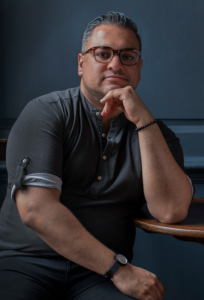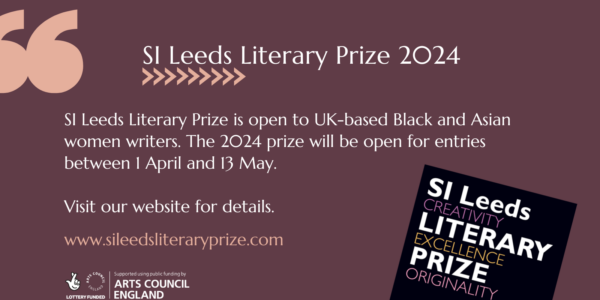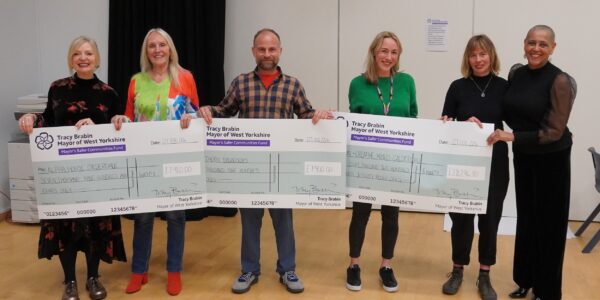Nikesh Shukla – The Stories We Tell
04 Dec 2019 / The Stories We Tell

Ten Rounds: Boxing and Writing
Inspiration for new books can come from the strangest places. My second novel was inspired by drunkenly googling bad tattoos with my best friend and finding his doppelganger online. My impetus to do the anthology The Good Immigrant came from taking part in a terrible panel on diversity issues one day and, the next, being trolled for being Asian on the Guardian message–boards by another author.
My novel The Boxer was born on a train carriage at midnight on a Tuesday. I was watching a Jason Statham film to pass the time, like only those films can, when I noticed three men, swigging from cans, all sitting rather close to me. I started to feel threatened, mostly because their proximity seemed unnecessary. The carriage was entirely empty. I muted the film and listened to them chatting. They were talking about me? Specifically, they were talking about the shirt I was wearing, a The Good Immigrant sweatshirt. It was causing one of them problems. He was pissed off with the sentiment and thought I deserved a good thumping, because apparently there was no such thing as a good immigrant. What saved me was surveillance culture in Britain, because they were all so shit up by the possibility of being caught on CCTV, they decided against beating me up.
Still, I was terrified.
It was an empty train carriage. All I needed to do was grab my laptop and bag, and go and sit somewhere else. Somewhere with other people. But I was stuck to my seat, shrinking. All I needed to do was stand up and walk away. Why couldn’t I do that? I sat for two more stops till they got off; I sat watching my Jason Statham film on mute, my heart pounding, my entire body pressed into the window as I made myself as small as possible and listened to their drunken ‘bants’. I was so scared that anything now – the wrong look, standing up, looking in their direction – would make them all beat me up. All I needed to do was stand up. And walk away. And if things went wrong, then I should be able to defend myself, right?
That feeling stayed with me. The feeling of terror in a public space, of being seen as my skin colour (and sweatshirt slogan) first and foremost, and of wanting to be as small as possible. It drove me to taking up boxing.
I fell into boxing with a real intense passion. Talking to friends, like the writers Hayley Campbell, Robert Kazandjian and Assed Baig about boxing and learning the sport, I got over my fear of the club, which I had imagined to be a toxic male meathead paradise. The truth was, this was a new community, much more diverse than any other aspect of my life in Bristol.
At this point, it’s important to add that writing is living and then processing and then interrogating. All the while, I didn’t know I was leading myself towards a book about a boxer. All I knew was I wanted to not feel that feeling of terror again.
A few months into my boxing training, I was going twice a week and feeling stronger, fitter, happier. I took up space and I owned the space I took up. It was a wonderful feeling.
Sometimes, the best part of being a writer, an artist, a creative, is the random conversation that leads you down a new path of thinking. I sat with Anne-Marie, an exceptional BBC Radio 4 producer, chatting about some ideas I had for ‘The Food Programme’. None of them were quite what she was into, but an offhand comment I made about recently taking up boxing made her stop. She looked at me.
‘Would you like to do a show about boxing?’ she asked.
‘I don’t know anything,’ I told her, laughing, worrying I had made two months of training sound like I was the heavyweight champion of the world.
She told me about another show she produced, called ‘One On One’, where artists from different fields interviewed three people in an area they had an interest in. I could do a ‘One On One’ series about boxing if I wanted to. I have never considered myself to be a member of the liberal metropolitan elite. Ever. But doing a Radio 4 series as research for a novel – that’s pretty liberal metropolitan elite-y.
Also, inspiration can come from anywhere. And sometimes, while you’re waiting for inspiration, your editor will email you and ask how you’re getting on with ideas for the second book in your contract…
The three interviews I did were as follows:
1) with Hayley Campbell, about how she used boxing to deal with grief;
2) with Kieran Farrell, about how a life-threatening injury ended his boxing career;
3) with Dr Deborah Jump, about how boxing can teach young men discipline and confidence.
It was the last interview that gave me the biggest pause – because in the interview, Dr Jump turned the questioning back on me and asked why I wanted to learn a form of consensual punching. Why not self-defence? Why not non-violent communication? Why not conflict resolution? Why boxing?
And I had to admit to her that there was something within me that wanted to fight. Something I was coming to terms with.
‘So?’ my editor, Emma, asked me on the phone as we caught up. ‘What’s the new book going to be about?’
‘I think it’s going to be about boxing?’ I said, unsure. ‘I think it’s going to be about racism and trauma and grief, and why we fight and whether it can teach you confidence.’
‘Great,’ she said. ‘Great themes. You just need a story now.’
I thought about that incident on the train, trying to remember every single thing about that feeling, of being singled out. I thought about what could have happened. Great stories often come out of ‘what if?’ scenarios. What if I had been beaten up for being a person from an immigrant background? What would have happened to me afterwards? I thought about the visceral feeling of wanting to leave your body, and of being stuck in it. I thought about the trauma following every single racist incident I’ve encountered. How I’ve felt, how my brain has been scrambled and my confidence utterly destroyed.
I thought about myself as a teenager.
How might I, as a teenager, have been in that moment?
And The Boxer was born. Maybe, I thought, I could do a sports drama about the trauma of racism; about how someone, abused in a racist attack, finds himself in a boxing ring again. It was good but it needed something else.
One of the reasons I love writing Young Adult Fiction or YA is I feel free to play with form more than I have done in the past, especially in how I discuss social issues. It’s boring being a political writer who beats a reader over the head with characters who talk in rhetoric and debate and political theory. My story was not ‘The West Wing’, not that I’m cussing ‘The West Wing’. They somehow make it work. But I can’t.
I was recently inspired by the 2017 film Get Out and how it was able to use horror tropes and archtypes, with recognisable stereotypes and racial microaggressions endured by Black men to tell a compelling story. The way it interrogates a social issue using a genre is inspired and brilliant. To the point where, if art is to be an empathy canon, it does a great job at giving the audience a second where they can begin to understand the fear a Black man feels when he hears a police siren. As Get Out vividly shows, it’s a loaded moment, one we will never truly, fully understand. But Jordan Peele is successful in giving us a moment to feel that shock and fear and sickening sense of resignation. It’s brilliant film–making. Even now I’m questioning whether that description I’ve given is adequate enough, and I apologise to Black men for even trying to sum up that feeling. It’s not my experience to try and encapsulate.
In Run, Riot, my first YA novel, I wanted to explore gentrification and make it digestible and understandable for teenagers, so they could see how it was happening around them. Employing a real-time thriller in a single location gave me the element of suspense, familiar territory and genre mechanics to ensure that Run, Riot was never too polemical.
I wanted to do the same thing with The Boxer. How to do that? I came across a quote by Nelson Mandela: ‘I did not enjoy the violence of boxing so much as the science of it. I was intrigued by how one moved one’s body to protect oneself, how one used a strategy both to attack and retreat, how one paced oneself over a match.’
And it hit me: if boxing is about protection and pacing and strategy and survival, then surely, there was memory in our muscles. And surely the muscle–memory was inextricably linked to trauma.
The award-winning film Slumdog Millionaire is based on a book by Vikas Swarup called Q&A. I read it years ago, and the structure of it always stayed with me: how in the present time of the novel, the main kid character is being tortured by a policeman, who’s trying to understand how he cheated in this game show. And in the game show, he is being asked questions he knows all the answers to. And he remembers how he came to know those answers, memories which form anecdotal asides in a greater piece of storytelling about his rite of passage from boyhood to manhood.
I wondered whether this structure would work in The Boxer. If our main character is in the ten rounds of his first ever boxing match, and each chapter is topped and tailed with the muscle–memory of his movement, we can then flash back to see how he got to this point. Yes, that was it! We see him fight for the first time. And he remembers, as he punches and is punched, how he got to this point. Perfect!
Except now we need conflict! If he took up boxing following a racist attack, what would offer the most dramatic irony when facing the boxing challenge?
His opponent is his now ex-best friend.
Yeah. That was it.
And what would be the biggest conflict, the one that caused him and his friend to no longer like each other?
His friend has been radicalised by the far right!
Now I had a novel.
And not only that, but my conversations with Hayley and with Kieran and with Deborah and with my boxing instructor, and with young people who had flirted with the far right, and with young people (I forgot to mention: I used to be a youth worker) who had been attacked for their race, all hit me.
I had the themes, I had the characters, I had the structure.
I just had to write the thing.
I guess this is a long-winded way of saying, savour each conversation. And look within: sometimes the best novels are born out of something we have experienced. What’s on the page is, event-wise, different from what happened to me. But thematically, and story-wise, it is everything I’ve been thinking about since that train event.
That ‘everything’ made me write the novel. It made me look at the world and myself and the people around me in a different way. It pushed me into a boxing gym. And most novels start with a main character breaking the cycle of their every day existence to do something new. The moment I walked into Bristol Boxing Gym was the moment this novel started. All the research, all the feelings, all the people, they were all there because of that one moment.
I’m so proud of this book and also so grateful to everyone who helped it on along the way. By the way, I still box. I went today in fact. And I know that if something like those three can-swigging guys on the train ever happens again, I now feel the confidence to stand up and walk away.
Find out more about The Stories We Tell.
 Nikesh Shukla is a novelist and screenwriter. He is the author of Coconut Unlimited (shortlisted for the Costa First Novel Award), Meatspace and the critically acclaimed The One Who Wrote Destiny . Nikesh is a contributing editor to the Observer Magazine and was previously their columnist. He is also the editor of the best–selling essay collection, The Good Immigrant, which won the Reader’s Choice at the Books Are My Bag Awards. He co-edited The Good Immigrant USA with Chimene Suleyman. He is also the author of two YA novels, Run, Riot and The Boxer. Nikesh was one of Time Magazine’s cultural leaders, Foreign Policy magazine’s 100 Global Thinkers and The Bookseller’s 100 most influential people in publishing in 2016 and in 2017. He is the co-founder of the literary journals, The Good Journal and The Good Literary Agency, a Fellow of the Royal Society of Literature, and a member of the Folio Academy.
Nikesh Shukla is a novelist and screenwriter. He is the author of Coconut Unlimited (shortlisted for the Costa First Novel Award), Meatspace and the critically acclaimed The One Who Wrote Destiny . Nikesh is a contributing editor to the Observer Magazine and was previously their columnist. He is also the editor of the best–selling essay collection, The Good Immigrant, which won the Reader’s Choice at the Books Are My Bag Awards. He co-edited The Good Immigrant USA with Chimene Suleyman. He is also the author of two YA novels, Run, Riot and The Boxer. Nikesh was one of Time Magazine’s cultural leaders, Foreign Policy magazine’s 100 Global Thinkers and The Bookseller’s 100 most influential people in publishing in 2016 and in 2017. He is the co-founder of the literary journals, The Good Journal and The Good Literary Agency, a Fellow of the Royal Society of Literature, and a member of the Folio Academy.



